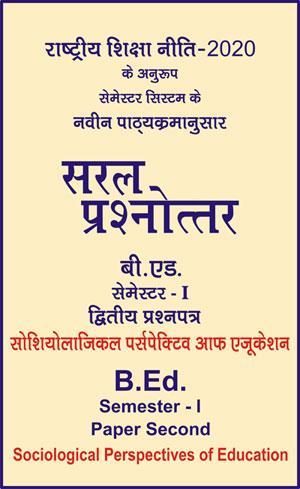|
बी एड - एम एड >> बी.एड. सेमेस्टर-1 प्रश्नपत्र-II - सोशियोलाजिकल पर्सपेक्टिव आफ एजूकेशन बी.एड. सेमेस्टर-1 प्रश्नपत्र-II - सोशियोलाजिकल पर्सपेक्टिव आफ एजूकेशनसरल प्रश्नोत्तर समूह
|
5 पाठक हैं |
|||||||
बी.एड. सेमेस्टर-1 प्रश्नपत्र-II - सोशियोलाजिकल पर्सपेक्टिव आफ एजूकेशन (अंग्रेजी भाषा मे)
Question- Submit Philosophical Analysis of the concepts of equality, Freedom and Democracy.
Ans.
Democracy
The word democracy is derived from Greek words demos and kratein, of which the former means the people and the latter means administration or government. This is borne out by the earlier descriptions of the conditions sought to be created by democracy. The objective of political society is to defend man’s natural unobtrusive rights-the right to freedom, property, security and opposition to injustice. The element of absolute authority basically inheres in the nation. No organization, no individual, can bring into play a power which is not clearly pertaining to him.
Basic Elements of Democracy
According to Sir Stafford Cripps, “By democracy we mean a system of government in which every adult citizen is equally free to express his views and desires, upon all subjects in whatever way he wishes and influences the majority of his fellow citizens to decide according to those view and to implement those desires.” As far as a definition of a democratic state is concerned, the above definition is quite appropriate. But, as Dr. S. Radhakrishnan pointed out in his University report, democracy is not merely a political system but a way of life which affords equality to every one, irrespective of the differences of race, religion, sex, economic status. This equality implies equal freedom and equal rights. In fact, democracy is a very comprehensive concept which can be interpreted in three ways : political, social and economic. The creation of democracy depends upon the extent to which the ideals of freedom, equality and brotherhood can be concretized in all the three spheres. Before going on to a detailed discussion of democracy in these three spheres, it is necessary to clarify these three fundamental elements.
(1) Liberty/Freedom : Liberty is a prequisite of the success of democracy. John Stuart Mill attached the greatest importance to the liberty of the individual. But liberty does not imply complete willfulness, for, freedom is not absolute but subject to control imposed by the individual’s owned conscience. Liberty implies the freedom given to the individual to develop his own abilities as he thinks best, without being conditioned or restricted by any external factor. But the freedom of a large number of people is possible only then no single individual has unlimited power and no individual misuses the rights given to him.
(2) Equality : If democracy is to be successful it is necessary for individual to be socially, politically and economically equal. Generally speaking, no privileges or special should be given to any class of people in a democracy. But equality also does not imply a deliberate neglect of individual differences between one person and another. Stated more accurately, equality actually means an equality of purpose, because equality cannot be used as the basis for ignoring differences between individuals. Lord Haldane was quite correct when he said that one cannot make all people equal because nature is far too powerful. While one women is born beautiful, another is ugly, and this creates great differences. One man is born with remarkable intelligence, while another is remarkable for the lack of it. Thus the concept of equality should be abandoned, for it has governed the minds of people long enough, with little good effect. In democracy it is perfectly practical to give certain privileges to a backward class of people in order to give them an opportunity to raise themselves to the levels of others, but all such efforts should exceptions, not the rule. In this way, offices in the administration or government should be open to all those who have the abilities and qualities required for such jobs. Every adult should have the right to vote. Every individual should have the opportunity to get employment which will bring him a wage sufficient to allow him to live well. Unemployment, famine and such conditions can prove fatal to democracy.
(3) Fraternity : It is important to achieve the ideal of brotherhood in a democracy because this is the only way of removing the psychological obstacles to democracy. The real difficulty lies not in the establishment of a democratic government but in the creation of a democratic society, to which democratic government is but a means or agency. Brotherhood is the chief characteristic of a democratic society, and cooperation the basis on which members of such a society work together. If a democratic society is to be created it is essential that every effort be made to increase brotherhood and cooperation. G.D.H. Cole is correct when he says,“A democrat is someone who has a physical glow of sympathy and love for any one, who comes to him honestly, looking for sympathy and help; a man is not a democrat, however justly he may try to behave to his fellow men, unless he feels like that,” Hence, the establishment of a democratic society requires a complete change in the ideas, personalities and patterns of behaviour of the people. And for this all these people must develop totally. It is difficult even to conceive of democracy in the absence of a liberal mind, sympathy, love, consciousness of social responsibility, a high character and a developed personality.
|
|||||














